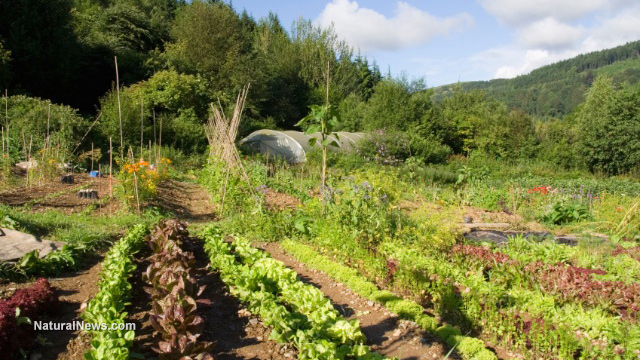Gardening when your life depends on it: five food production strategies that may keep you alive during hard times
Monday, June 13, 2016 by: J. D. Heyes
Tags: home gardening, food preparation, survival skills

(NaturalNews) Few of us like to think about what life would be like if our society were to break down, even temporarily, due to internal or external factors like war, insurrection, famine or natural disaster.
But most of us do indeed plan for the worst, don't we? That's why we purchase health, homeowners, life, automobile, flood and other types of insurance, right?
We ought to add "food insurance" to that list, and that's the concept behind "gardening when your life depends on it."
As with any preparation strategy, planning and resultant implementation should begin now, while things are calm. If you wait until times actually get tough, you've waited far too long. It would be like buying car insurance after you hit a tree or buying flood insurance when the water is three feet deep in your living room.
Here are five food production and gardening strategies that will help keep you alive during hard times. Just remember that you will get out of this what you put into it; if you just plan on things being "broken" for a few days, your meager preparations won't matter much if the crisis lasts weeks, months or even years.
Canning: All sorts of fruits, vegetables and other foods can been "canned" - that is, cooked down and placed in sealed jars and containers for later consumption. As noted by the National Center for Home Food Preservation (yeah, I didn't know there was such an organization either, until I began researching this piece), it is necessary to can most fresh foods because the high content of water they contain.
"They spoil or lose their quality for several reasons: growth of undesirable microorganisms-bacteria, molds, and yeasts, activity of food enzymes, reactions with oxygen, moisture loss," says the organization.
The NCHFP provides detailed instructions about canning and juicing - techniques, equipment and additional preservation ingredients - here.
Dehydration: Have you ever had beef jerky? Meats are only one food product that can be dehydrated and stored for emergencies; fruits and veggies can also be dehydrated and later reconstituted with water or consumed outright.
Dehydration has a number of advantages. For one, it is a low-cost way to preserve foods that are free from concerns about botulism and so forth. Also, dried food takes up less space than cans do and you don't need a freezer to keep them "fresh."
Check out dehydration techniques here.
Old-fashioned food storage: Purchasing a variety of long-term storable foods is a wise decision for variety of reasons, and one of them is, well, variety. When times are tough, food is food, right? Not necessarily; having a variety of foods to eat not only improves nutritional intake, but it is a huge psychological boost as well.
Storable foods come in all types. Here at Natural News we offer only organic products. But a quick Google Search of "storable food" brings up a host of other choices as well.
Just make sure whatever you buy a) will be placed in a darker, cool place; and b) has a shelf life of at least 15 years.
Sprouting: Even during a prolonged crisis it is possible to obtain a supply of nutritious superfoods through a gardening strategy known as "sprouting." As noted by Mike Adams, the Health Ranger and editor of Natural News, "sprouting is no more complicated than having a ready supply of sprouting seeds, then adding water and sprouting your own living nutrition for mere pennies a serving."
There are three reasons for sprouting: vegans and vegetarians use them to make up the bulk of their diets; as a superfood alternative to grow food indoors, without soil, to save space; and as an economical way to prepare.
Check out this video to learn how to sprout.
Curing/Smoking of meats: Everything from deer to fish to other sources of meat, in the wild or from your family farm, can be cured and smoked for later consumption.
"Curing is the addition to meats of some combination of salt, sugar, nitrite and/or nitrate for the purposes of preservation, flavor and color," says the NCHFP. "The cure ingredients can be rubbed on to the food surface, mixed into foods dry (dry curing), or dissolved in water (brine, wet, or pickle curing)."
For techniques and instructions in curing all kinds of meats, click here.
You may have noticed that some of these strategies involve heavy use of one precious commodity - clean, potable water, which will be hard to find when times are hard. You should always keep a supply of water in storage as well, but understand that the lack of water will hamper the "stay alive" strategies listed in here after disaster strikes.
So don't wait. Get started today.
Sources for this article include:
http://nchfp.uga.edu/how/can_home.html
http://www.naturalnews.com
http://tv.naturalnews.com/v.asp?v=66095ABDE53CD5AC994E73DBFE3EEF0B
http://www.wikihow.com/Cure-Meat
Home gardening at FETCH.news
Get independent news alerts on natural cures, food lab tests, cannabis medicine, science, robotics, drones, privacy and more.
Take Action: Support Natural News by linking to this article from your website
Permalink to this article:
Embed article link: (copy HTML code below):
Reprinting this article:
Non-commercial use OK, cite NaturalNews.com with clickable link.
Follow Natural News on Facebook, Twitter, Google Plus, and Pinterest
- The hidden danger in your food: Titanium dioxide and the health risks you need to know
- U.S. VP Vance warns Europe against adopting Chinese open-source AI models
- DIRTY VACCINES: Dr. Anthony "Fraudulent" Fauci, King of the Covid scamdemic, admits "We don't do placebo trials on vaccines"
- Dr. Robert O. Young’s research notes that ACID BUILDUP may be one of the leading causes of CANCER today
- Remember, they are not KILLING seagulls, rats or deer, STRANGELY bird flu only affects chickens, cows and humans
- “Science For Sale” details how the government works with corporations to undermine true science
- RFK Jr. clears key hurdle: Sen. Susan Collins backs controversial HHS nominee, signaling a new era for health policy
- The rise of digital authoritarianism: Larry Ellison wants everyone's data and DNA plugged into AI datacenters to guide our behaviors
- Decentralized AI: Mike Adams and Maria Zeee advocate for open source solutions to combat centralized control
- Two containers with completed ballots fall out of truck in Florida
- State Farm cancels thousands of home insurance policies in the Pacific Palisades region months before deadly fires
- FDA misled the judiciary about Pfizer’s vaccine documents
- Yes, the president can deploy troops to enforce immigration law
- U.S. to sell $300 million upgrade program for South Korean navy’s destroyers
- I Want My Bailout Money – new song released by Mike Adams
- Studies strongly suggest taurine supplementation can promote longevity
- The Health Ranger launches hot new hip-hop song, "Where The Money Go, Joe?" – with free MP3 download
- Mach 7 drone illustrates China's latest leap in hypersonic technology
- Democrats cry as “liberal supply chains” are wiped out and their favorite multi-billion dollar money machine is shut down
- “Cancer Gag Act” threatens farmers’ rights and public health: A dangerous push for corporate immunity
- PBS shutters DEI office in wake of Trump’s executive order
- RFK Jr. clears key hurdle: Sen. Susan Collins backs controversial HHS nominee, signaling a new era for health policy
- Trump is taking on the media, exposing defamation and WINNING BIG
- Chemotherapy found to increase the number of tumor cells circulating in the blood, spreading it to previously unaffected areas
- James V. DeLong’s book “Out of Bounds, Out of Control” provides a gripping tale of how the EPA operates outside the rule of law
- The new American dream: $500,000 nuclear bunkers and the fear of WWIII
- Global tensions, natural disasters and the looming shadow of world war - all predicted by Mike Adams and Steve Quayle three years ago
- A bold step forward: $900M slashed from Federal Education Research Office signals a return to local control
- Yes, the president can deploy troops to enforce immigration law
- Stan Johnson on the Health Ranger Report: Henry Gruver’s 2016 vision of second Trump term becomes reality in 2024
- HYSSOP: What research reveals about the health benefits of this ancient holy herb
- UK’s Online Safety Act comes into effect: The dangerous, slippery slope of censorship laws
- State Farm cancels thousands of home insurance policies in the Pacific Palisades region months before deadly fires
- Is America's "giant debt factory" Federal Reserve setting us up for an economic nightmare?
- Experts warn: Centralized digital currencies could be used to control how people behave
- Big Banks shift the burden of losses to taxpayers through the Federal Reserve in the form of BAILOUTS
- EPA advisor admits the agency is funneling billions to climate groups ahead of Trump’s return to White House
- HYSSOP: What research reveals about the health benefits of this ancient holy herb
- Global leaders unite to clamp down on “misinformation” with UN-backed Cascais Declaration
- I Want My Bailout Money – new song released by Mike Adams
- New BRICS banking system will render Western sanctions on Russia USELESS
- Mike Adams Sermon 42: God’s superfruit FIGS can fight warts, staph infections and cancer
- Essential home security tips: Protecting your property without electricity
- The new American dream: $500,000 nuclear bunkers and the fear of WWIII
- Beyond consequence
- Global tensions, natural disasters and the looming shadow of world war - all predicted by Mike Adams and Steve Quayle three years ago
- Texas border officials discover unaccompanied 4-year-old girl smuggled from Central America
- Homeless crisis in America GETTING WORSE as government continues to spend hundreds of billions on foreign aid
- Health Basics: Top 10 reasons to AVOID ALL VACCINES
- Female GOP senators defend Pete Hegseth amid MSM smears
- Big Banks shift the burden of losses to taxpayers through the Federal Reserve in the form of BAILOUTS
- Prepper recipes: How to make delicious acorn pancakes
- House GOP demands investigation into FEMA’s ignoring of pro-Trump rural areas in desperate need of aid
- Trump is taking on the media, exposing defamation and WINNING BIG
- Red Cross issues warning to stop blood plasma donations from vaccinated people
- Scientists confirm: GENIUS brain function can be spontaneously unleashed in humans without any apparent cause
- DATA: England’s vaccinated population had close to one million deaths in 23 months; unvaccinated population had less than 61,000 deaths over the same period
- HYSSOP: What research reveals about the health benefits of this ancient holy herb
- Arizona residents drive entire Maricopa County Board of Supervisors out of meeting after serving them for TREASON
- Fully vaccinated about to see “tsunami” of illness and death, warns virologist
- Today I asked our AI language model “Neo” about which phytonutrients or phytochemicals can block the spike protein related to SARS-CoV-2 … Here is what it answered…
- BREAKING: 2025 NDAA authorizes mandatory military draft of WOMEN across America… as Pentagon pursues global NUCLEAR war with both Russia and China at the same time
- We are building the infrastructure of human freedom… Brighteon.AI is the next launch that will put life-altering LLM technology into your hands for free
- Michael Yon warns of a ZIONIST TAKEOVER in Trump’s second administration
- ENGINEERED FAMINE: Oregon starts SHUTTING DOWN small farms “to protect the people”
- NASA admits that climate change occurs because of changes in Earth’s solar orbit, and NOT because of SUVs and fossil fuels
- Two containers with completed ballots fall out of truck in Florida
- Ozempic and Wegovy weight loss drugs are injectable LIZARD VENOM PEPTIDES that may unleash a devastating wave of organ failure… side effects align with symptoms of SNAKE BITES
- These 13 countries just signed an agreement to engineer a global FAMINE by destroying food supply
- Careless Whisper: AI-powered transcription tool being used by hospitals found to invent chunks of text no one ever said
- BBC staffers accuse media outlet’s executives of instituting bias in Gaza coverage, claiming favorable treatment of Israel
- Casual restaurant chain TGI Fridays files for BANKRUPTCY
Science News & Studies
Medicine News and Information
Food News & Studies
Health News & Studies
Herbs News & Information
Pollution News & Studies
Cancer News & Studies
Climate News & Studies
Survival News & Information
Gear News & Information
News covering technology, stocks, hackers, and more



"Big Tech and mainstream media are constantly trying to silence the independent voices that dare to bring you the truth about toxic food ingredients, dangerous medications and the failed, fraudulent science of the profit-driven medical establishment.
Email is one of the best ways to make sure you stay informed, without the censorship of the tech giants (Google, Apple, Facebook, Twitter, YouTube, etc.). Stay informed and you'll even likely learn information that may help save your own life."
–The Health Ranger, Mike Adams












































